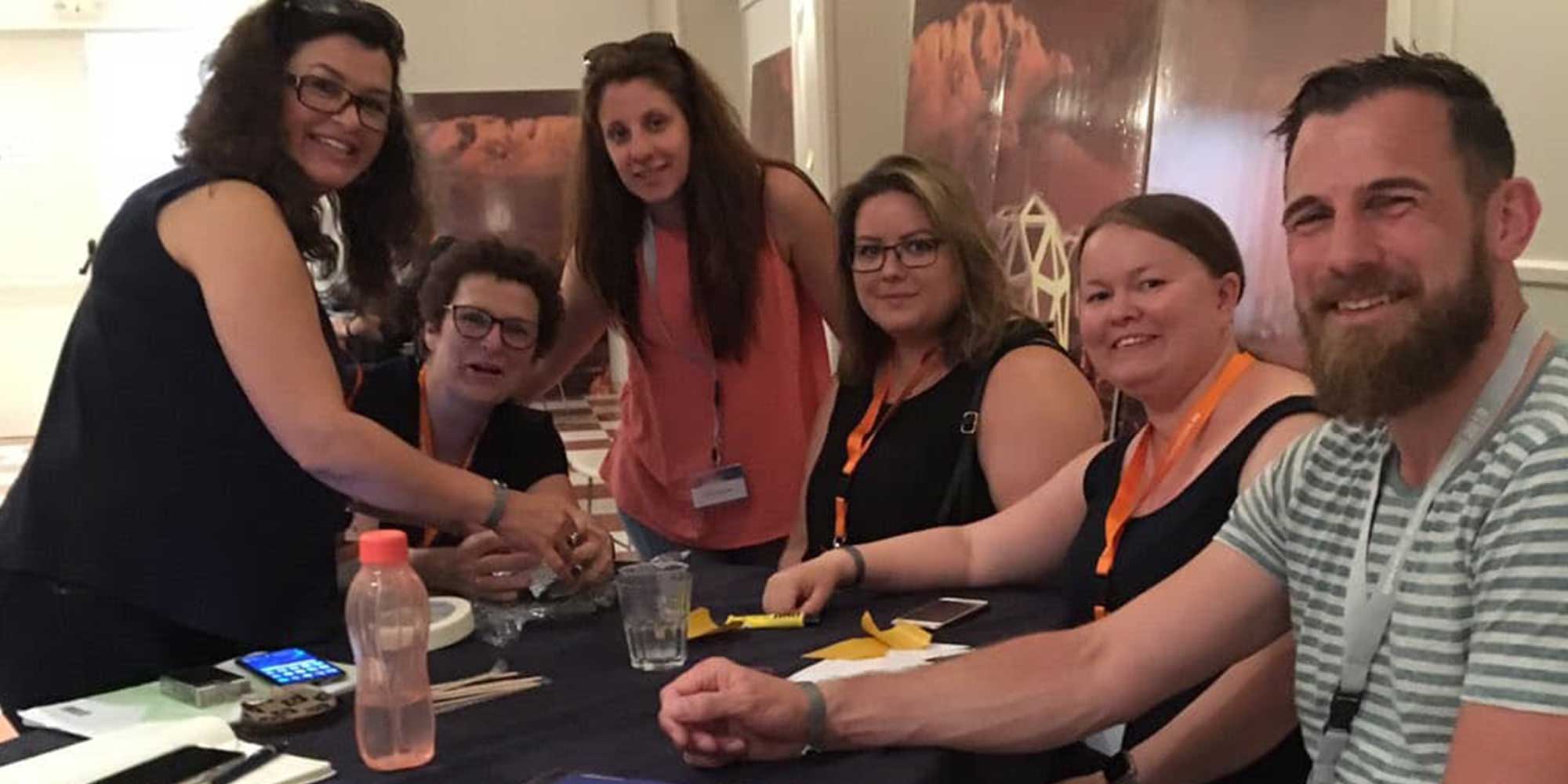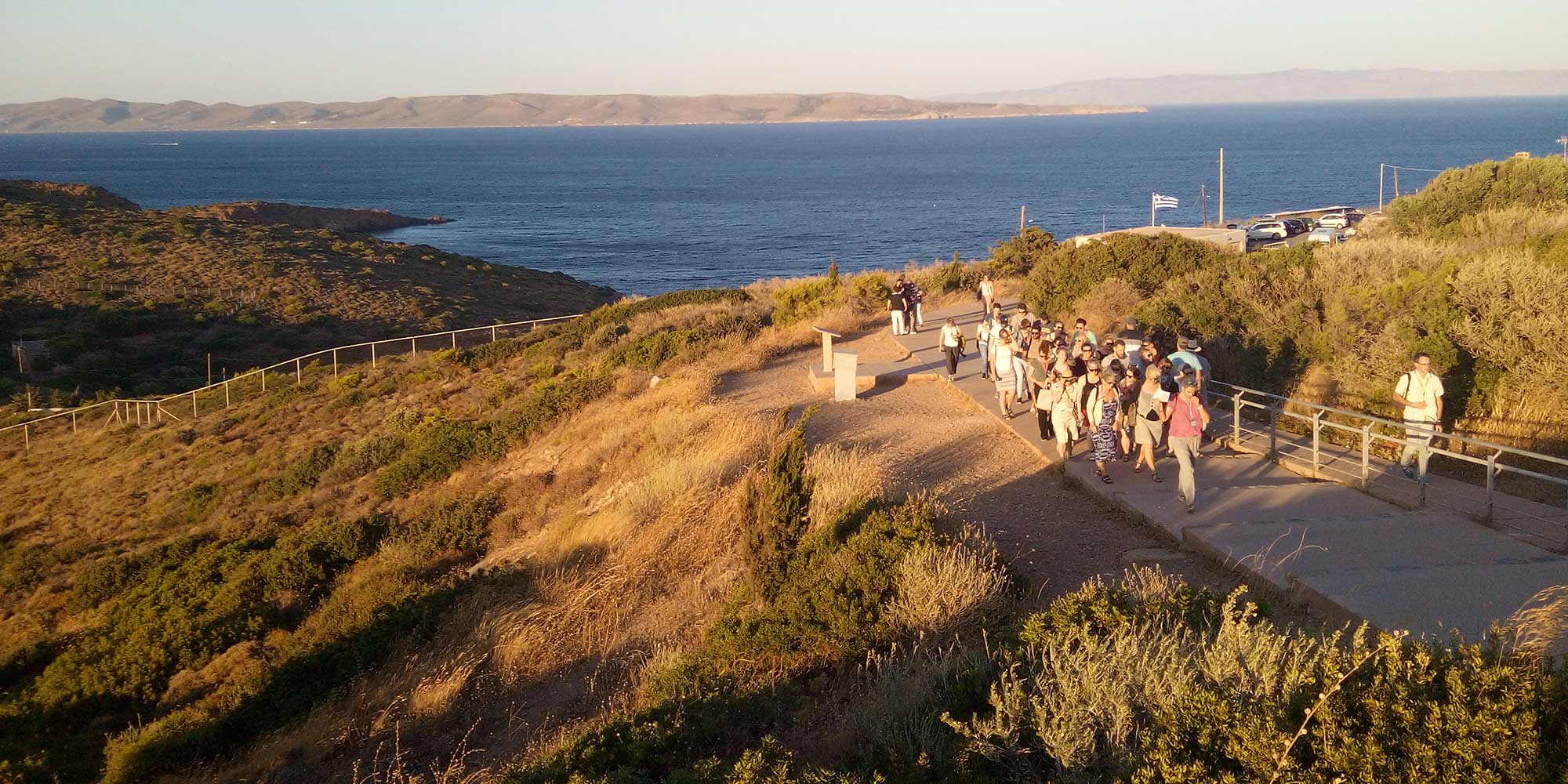About the spaceEU Teacher Engagement
spaceEU offers different opportunities for teachers. A summer course in Greece, an online course with direct engagement, space in the classroom where space experts visit your school and a wide selection of teaching materials. Also the activities and the exhibition can be adapted for classrooms.
To stay informed subscribe to our spaceEU newsletter or reach out to Laura with any questions through laura.welzenbach@ars.electronica.art.
spaceEU Teacher Summer/Fall School
Join us for an exciting and innovative course about introducing space exploration into the science classroom!
The accomplishments of European space science, technology and innovation are powerful vehicles to increase students’ appreciation of science and interest in pursuing a wide range of scientific and technical career paths in the future. To this end, the spaceEU summer/fall school will support teachers in exploring opportunities and entry points for space-related themes in the science curriculum. A special focus will be placed on the interdisciplinary profile of space exploration and how to create connections between disciplines in a school context.
Participants can expect exciting keynote presentations, hands-on workshops that blend together the science as a whole’ approach with inquiry-based learning and which can be deployed in and outside the classroom, reflections sessions and outings such as night-sky observation.
Winter School 2020
The spaceEU Teacher Summer School in 2020 had to be rescheduled due to the pandemic and takes place in November.
The Winter School is organized by our partner in Greece, Ellinogermaniki Agogi. Its main objective is to introduce to teachers on how they can use space exploration in their science class as a vehicle to increase students’ interest and appreciation of science and towards pursuing space related career paths in the future.
- Course dates: November 3 to November 13, 2020
- Language: English
Summer School 2019
All interested teachers and teaching professionals in STEM disciplines (Science, Technology, Engineering, and Mathematics) were invited to apply for a grant which supported their visit of the Summer School in June 2019 in Greece. It was about collaborating, exchanging and sharing ideas, as well as discovering educational resources with fellow teachers across Europe.
Mandatory criteria
- You are an in-service primary or secondary teacher.
- You are comfortable speaking, understanding and writing in English.
- You are available to participate in the summer school, for the full duration of the course.
- You live and work in Austria.
- You show genuine interest in promoting the cause of spaceEU:
- share the summer school experience with other teachers in future spaceEU professional development workshops
- implement at least one of the spaceEU activities/formats in your classroom/school
Desirable criteria:
- Have experience/interest in working with or motivating underrepresented youth in science careers.
- Demonstrate an existing interest in the use of space/astronomy in STEM education.
- Have participated in teacher communities (e.g. science and space education networks, groups etc.)
Stipend Support includes
- Travel (Flight from Austria to Athens)
- Accommodation in the Golden Coast Hotel & Bungalows
- 3 meals a day including snacks and coffee in the breaks
- Pick-up and drop of at Athens Airport (Two buses scheduled at different times on Sunday (day of arrival) and two buses on Friday (day of arrival))
- Classes (see last year’s programme to get in idea)
Trips, excursions and more
The summer school also offers a number of cultural events aiming not only to introduce a piece of Greek history to participants but to also give them the opportunity to socialize and get to know each other. Cultural events include a trip to the sanctuary of Poseidon at cape Sounion, a visit to the Acropolis and the Acropolis Museum (both events followed by dinner in local taverns) and a farewell dinner with live traditional music and dancing. The optional excursions need to be paid by the teacher. Find out more space.ea.gr
The “Space exploration in education” Summer School is organised in the context of the EU-funded spaceEU project. To find out more about spaceEU, visit space-eu.org.
Online Courses
spaceEU MOOC
spaceEU partner EUN will develop a new Massive Online Open Course to empower teachers from all levels of education as well as leaders of extracurricular activities and parents to teach space-related topics with a focus on climate change.
- Course start date: February 24, 2020
- Course end date: April 8, 2020
- Period: 5,5 weeks
- Effort per week: 4-5 hours (25 total)
- Language: English
MOOC Our Fragile Planet offers a certified online training course for teachers of all levels of education on space, climate and earth. Further information and the registration for Our Fragile Planet MOOC can be found here.
Further Webinars
- STEM Alliance offers different webinars on an ongoing basis. Each webinar is led by an expert. Participation is free, registration is required and attendees receive a certificate of attendance.
- Past webinars by Space Awareness focus on introducing space careers. A wide range of videos and hands on methods introduce the wide variety of jobs in the space industry.
- More career materials and MOOCs (Massive Open Online Course) can be found on the TIWI Plattform (Teaching ICT with Inquiry)
Teaching Materials
spaceEU and particularly one of its members, the European Schoolnet (EUN), as well as its coordinator, University Leiden, provide a wider range of teaching materials. The topics range from navigation to Islamic heritage and can be integrated in various classes and disciplines.
Space Awareness
The Space Awareness activities have been selected following popular topics for space in the school curricula. All resources have been reviewed by an educator and a scientist and are tested and improved by teachers and educators all around Europe and beyond.
- Our wonderful Universe
- Our fragile planet
- Navigation through the ages
- The journey of the ideas
Examples
- A View from Above: Students investigate how satellite images obtained at different wavelengths help to identify Earth surface features like vegetation and open water areas by using a specially designed software package, LEO Works. Students inspect and analyse real satellite data to produce colour images and maps of spectral indices and learn how to interpret them and their uses. Another easy approach about how to integrate satellite images in your classes can be found in the Step into Space exhibition through the EO Browser activity. Link to toolkit will follow shortly.
- Where on Earth am I? This activity is also part of the Step into Space exhibition. There you can experience how navigation systems work in a short 5 minute interaction. The pupils will understand the basic principle of satellite based positioning and navigation. By introducing a simulated and simplified 2D model of the satellite configuration, they will learn to determine their location on Earth solely by translating the signal travel time receiving from four satellites.
- Fizzy Balloons — CO2 in School: When you add water to effervescent (fizzy) tablets or baking powder, bubbles are formed: a gas is produced. You can use this gas to inflate a balloon without blowing it up yourself. What kind of gas is it? Let us collect this gas and analyse it through experiments. This activity introduces carbon dioxide (CO2) to students through a hands-on experiment. Students learn some properties of CO2 behaviour. You can find detailed teaching materials for your classes here.
ESA European Space Agency Education
The European Space Agency are also a source for innovative teaching materials.
ESA Education: The ESA Education platform offers school initiatives like the Climate Detectives school project or the Moon Camp. The Moon Camp Challenge is an interdisciplinary school project that invites students, aged up to 18 years, to team up and 3D design their own base on the Moon.
ESA Videos and ESA Images: In the ESA video and image section you can find video support for your classes. Here is an example of how they introduce space exploration through their comic heros for example.
Scientix
The useful Resource Repository helps to find the right teaching material for your classroom. You are able to filter categories like subject, age, type and language. Beyond they offer the following for teachers:
- Get involved in European STEM education projects via our matching tool
- Participate in national and European workshops and professional development courses
- Download all presentations, videos and materials from our conferences, and stay tuned for future ones
- Participate in online training, webinars or communities of practice
Stories of Tomorrow
Ready to use teaching materials can also be found in the online library of Stories of Tomorrow. The project uses storytelling as catalyst for the effective interaction between art and STEM disciplines which share in many ways similar values, similar themes and similar characteristics. The STORIES project proposes to introduce creative approaches in STEM education to generate alternative ideas and strategies within scientific enquiry as an individual or group, and reasoning critically between these.
create your world Tour
Ars Electronica also offers classroom activities through the create your world tour. Bring space topics in your classroom through teaching artists and peer to peer learning.
ESERO
ESERO (European Space Education Resource Office) is ESA’s umbrella educational project supporting formal education of the sciences (STEM — Science, Technology, Engineering and Mathematics) in European primary and secondary schools. The Austrian office is led by Ars Electronica. Find out more about our space education opportunities on our website.
 spaceEU project has received funding from the European Union’´s Horizon 2020 Framework Programme for Research and Innovation under grant agreement No. 821832
spaceEU project has received funding from the European Union’´s Horizon 2020 Framework Programme for Research and Innovation under grant agreement No. 821832

